
All iLive content is medically reviewed or fact checked to ensure as much factual accuracy as possible.
We have strict sourcing guidelines and only link to reputable media sites, academic research institutions and, whenever possible, medically peer reviewed studies. Note that the numbers in parentheses ([1], [2], etc.) are clickable links to these studies.
If you feel that any of our content is inaccurate, out-of-date, or otherwise questionable, please select it and press Ctrl + Enter.
Non-hormonal ointments for psoriasis: list of effective preparations
Medical expert of the article
Last reviewed: 03.07.2025
Psoriasis is a genetic skin disease that is accompanied by a rash, peeling, and itching. This disease significantly limits a person's normal life. In addition to the fact that the disease is accompanied by constant itching, which causes discomfort to a person, there are other unpleasant symptoms. For example, a rash does not make the patient's appearance more attractive. Peeling, which sometimes resembles lichen, repels people. All this entails not only problems associated with the disease, but also psychological problems and discomfort.
The disease has been known for a long time, at different times in different countries it was called differently. In the Middle Ages, this disease was considered a family curse. In fact, everything is much simpler - there is a hereditary predisposition to this disease, which determines a person's tendency to the disease.
A distinctive feature of the disease is that it is almost never completely cured. It is a chronic disease that has a sluggish nature with periodic outbreaks of exacerbations. These exacerbations can be stopped and the patient's condition can be alleviated in various ways. It is always necessary to remember that the disease is incurable. It is impossible to cure it completely, but it is possible to eliminate the symptoms and alleviate the condition.
The exact causes of the disease have not been fully clarified. Currently, there are numerous discussions about the causes of the disease and its origin. In many ways, scientists' opinions differ, but the only thing that all specialists agree on is that the disease is genetic and is passed down from generation to generation.
In addition to hereditary predisposition, however, there is also variability. External factors affect the course of the disease. For example, stress, climate change, nervous and mental strain, poor nutrition can provoke an exacerbation of the disease. Medicines, hormonal, non-hormonal ointments for psoriasis can alleviate the course of the disease.
Since the cause of the disease has not yet been fully clarified, there can be no talk of etiological therapy. Treatment can only be complex. In addition to drug treatment, it is also necessary to follow a daily routine, diet, eat right, and try to improve the quality of life. It is necessary to take measures that will help prolong the period of remission.
All treatment and preventive measures aimed at overcoming the symptoms of psoriasis are based on drug therapy. Local and general medications are used. In psoriasis, non-hormonal ointments for psoriasis are used first.
 [ 1 ]
[ 1 ]
ATC classification
Pharmacological group
Pharmachologic effect
Indications non-hormonal ointments for psoriasis
All the drugs that will be described in this article are used to treat and relieve the main symptoms of psoriasis. Since this disease is chronic and sluggish, medications and folk remedies can only be used to get rid of the main symptoms and improve the general health of the patient. But this does not mean that treatment is not necessary. The fact is that the so-called psoriasis plaques are a good place for the development of pathogenic microorganisms. Therefore, patients are advised to constantly monitor the health of their skin and prevent relapses of psoriasis.
The main value of non-hormonal ointments is the ability to quickly and effectively eliminate the problem in a short time, achieving the desired effect. At first glance, it seems that ointments that do not contain hormones cannot carry threats and dangers. But this is far from true. These ointments are no less dangerous. They can cause many side effects. There are numerous contraindications. Therefore, in order to protect yourself, it is recommended to use the drugs only after prior consultation with a doctor.
In general, ointments can be used if signs of exacerbation of psoriasis have appeared, if the condition has significantly worsened. As soon as the first signs appear, they can be considered an indication for the use of ointment. There are many different ointments that differ in the mechanism of action, composition, and main active ingredient. The best option can be selected only after consulting a doctor.
The indication is a pronounced rash, irritation, redness of the skin. All this is accompanied by severe itching. Other skin lesions may also be observed. There are ointments that are intended for the treatment of the scalp. There are ointments intended for the treatment of nails.
Ointments are used externally. In rare, exceptional cases (and not all types), they can be recommended for internal use for various lesions of internal organs and mucous membranes. The peculiarity of non-hormonal ointments is that they can be prescribed for dermatitis of non-infectious nature. They have also proven themselves well for rashes of various origins. In cases where the cause of the rash is unclear, these ointments are also used.
Non-hormonal ointments are indicated at the initial stage of the disease. They have a positive effect on eczema, neurodermatitis, seborrhea. They can also be useful not only for psoriasis, but also for various types of lichen. They help get rid of bedsores, non-healing wounds, erysipelas. They can be useful even in the early stages of gangrene.
They have a powerful effect as part of complex therapy for various dermatological diseases.
Release form
Usually, non-hormonal drugs for the treatment of psoriasis are available in the form of ointments.
Names of non-hormonal ointments for psoriasis
There are non-hormonal ointments that have proven themselves in the treatment of psoriasis and other dermatological diseases. Below are the names of the most effective non-hormonal ointments:
- Acrustal
- Akriderm
- Antipsoriasis
- Kartalin
- Coriodermin
- Salicylic ointment
- Zinc ointment
- Zinokap
- Daivonex
- Losterin
- Psoriaten
- We see
- Magnipsor
- Psoriasis.
Pharmacodynamics
The use of non-hormonal ointments makes it possible to avoid the progression of the disease, to prevent the development of the pathological process. Due to its main properties, it eliminates many skin problems. The main action is soft, gentle. It relieves inflammation, stops the manifestation of an allergic reaction. It forms a reliable barrier that does not allow the infection to penetrate into the body and contribute to the development of the disease even more intensively.
Have a significant advantage over hormonal ointments. Firstly, non-hormonal ointments can be described as relatively safe when compared to hormonal ones. Hormonal ointments entail many serious consequences. Even if they have a quick and long-lasting effect, this does not mean that they are useful. They produce the opposite effect. The active substance is by its nature a hormone that penetrates the body, integrates into the metabolic chain and begins to regulate the body's functions.
Since it is a synthetic hormone, it is foreign to the body. The entire body's regulatory system is disrupted. Serious consequences may be observed, such as metabolic disorders, disruption of the endocrine glands, reproductive system disorders, development of tumors, malignant neoplasms. Such effects are not observed in non-hormonal ointments. Therefore, in terms of impact on the body's hormonal system, they are relatively safe.
But this does not mean that they do not have a negative impact on the body and their use can be abused. Thus, ointments of non-hormonal origin can contain no less dangerous substances in their composition, which also negatively affect the general condition and well-being of the patient.
Non-hormonal ointments contain a large number of various toxic, potent substances. On the one hand, this has a positive effect on the skin, relieves the symptoms of psoriasis, dermatitis of various origins. On the other hand, toxic substances penetrate the blood, are carried throughout the body with the blood, and provide their effect on tissues and organs.
In this regard, non-hormonal ointments are mostly contraindicated for pregnant and lactating women, children under one year. Many ointments can also have a negative effect, which manifests itself in the form of intoxication, allergic reactions, and worsening of diseases. The disease progresses with improper use of such drugs.
The best way to use non-hormonal ointments is to use them as part of a combination therapy. They can be combined well with medications, ointments, creams. As part of a combination therapy, some substances react with each other and have a complex effect on the body.
In addition to the local effect on the body, ointments also have a systemic effect.
Pharmacodynamics is based on the ability of active substances to penetrate the dermatological barrier. This makes it possible to spread throughout the body with blood, penetrate into tissue fluid, and correct endocrine and metabolic disorders. By penetrating into tissue, the ointment promotes enhanced synthesis of tissue mediators. The main effect of mediators is that they significantly reduce the inflammatory process. Mediators are easily distributed with the blood flow throughout the body and can stimulate the immune system.
Thus, non-hormonal ointments can be successfully used for inflammatory processes on the hands, feet, elbows, palms, feet, and hands. They significantly affect the elimination of dry skin and prevent peeling.
Ointments have different effects. They can affect inflammatory processes of various etiologies. Daivonex is mainly used to relieve various inflammatory processes. Its mechanism of action is similar to vitamin D.
The mechanism of action of Akrustal is aimed at normalizing metabolic processes in the body. The ointment is aimed at relieving skin irritation. The skin is significantly smoothed. Metabolic processes are normalized in the cells of the epidermis.
Non-hormonal ointments promote rejuvenation of the epithelium, during which the skin of the upper layer peels off. The pain syndrome is also reduced.
Salicylic ointment affects the scalp, hair. Zinc ointment adsorbs toxins, exfoliates epidermal particles.
One of the most effective drugs for the treatment of psoriasis is Daivonex, so here we will consider its pharmacodynamics and pharmacokinetics.
Calcipotriol is an analogue of vitamin D. It helps to stimulate morphological differentiation and, at the same time, suppress proliferation of keratinocytes. It is this action that underlies the fight against psoriasis. In addition, this substance is a powerful inhibitor of T-lymphocyte activation caused by interleukin 1. At the same time, calcipotriol acts hundreds of times weaker than vitamin D3 on calcium metabolism.
Transdermal absorption of the main active substance of the drug is 1-5% of the total dose. Calcipotriol is very quickly biotransformed in the liver, forming pharmacologically inactive metabolites. It has a short half-life.
Pharmacokinetics
The action of non-hormonal ointments is based on the ability of active substances to penetrate into tissues, into cells. The active substance passes through the dermatological barrier. The substance penetrates through the barrier into the deep layers, penetrates into the cells of the dermis, enters into metabolic processes at the tissue and cellular level. By integrating into the metabolic chain, substances stimulate metabolic processes, and also contribute to the production of necessary hormones, tissue mediators. These substances are released into the blood, then trigger a series of biochemical reactions, as a result of which the body is rebuilt, produces substances that reduce the inflammatory process. In addition, these substances can provide protection from irritants.
Dosing and administration
The method of application of all ointments is external. The ointment should be applied to areas affected by psoriasis or other pathology. It should be applied in a thin layer. The frequency of application and the duration of the course of treatment depend on the characteristics of the course of the disease, the severity of the disease, and the individual characteristics of the body. The method of application and dosage are prescribed by the doctor.
Before applying the ointment, it is recommended to test it on a separate area of skin (on a small area). If there is no adverse reaction, the ointment can be applied to the entire affected area. Children are recommended to treat the affected areas at certain intervals. Only one area is treated at a time.
All non-hormonal ointments for psoriasis can be divided into the following types:
- Indifferent ointments.
- Products with vitamin D.
- Ointments with oil.
- Vitamin ointments.
- Homeopathic medicines.
- Solidol-based products.
The main indifferent ointments for combating the symptoms of psoriasis:
Salicylic ointment. This is a well-known keratolytic agent that is used to treat many skin diseases. It is often prescribed for exacerbations of psoriasis. The main component is salicylic acid.
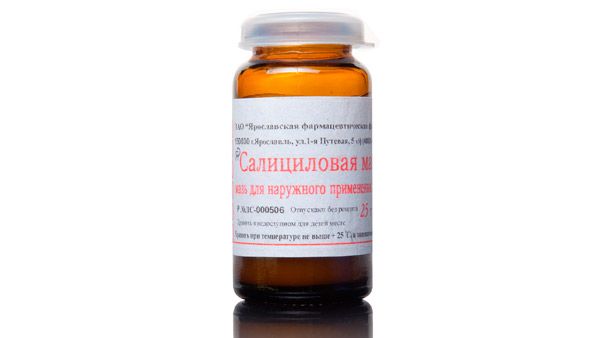
For complex treatment of psoriasis, use a two percent salicylic ointment. It can be mixed with Vaseline to improve the effect. Apply a small amount to the problem skin before going to bed. Cover with a napkin and apply a bandage. It is recommended to change the bandage every day.
The drug should not be used in case of individual intolerance to salicylic acid, in early childhood, in case of renal failure. The main side effects are: allergy, itching, redness, burning, increased body temperature.
Zinc ointment. The active ingredient of the drug is zinc oxide. It has anti-inflammatory, astringent, drying, antiseptic and adsorbent effects. Helps reduce inflammation, redness, creates a protective barrier on problem skin.
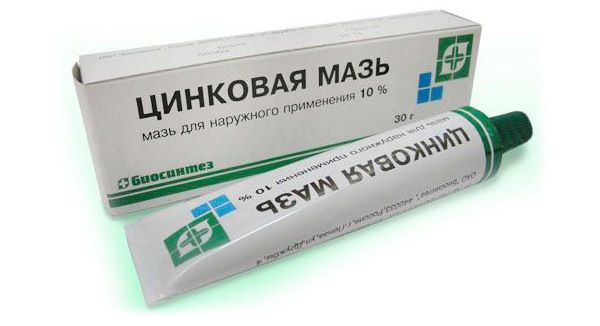
It is used locally, externally. The duration and dosage depend on the symptoms of psoriasis and the degree of the disease, so it is prescribed individually. Among the side effects, it is worth highlighting: allergies, skin rash, itching, burning, hyperemia. It cannot be used in case of hypersensitivity to the main component.
Vitamin D products:
Psorkutan. An ointment for external use that helps normalize proliferation and differentiation of keratinocytes. The active ingredient is calcipotriol. It is considered an analogue of vitamin D.
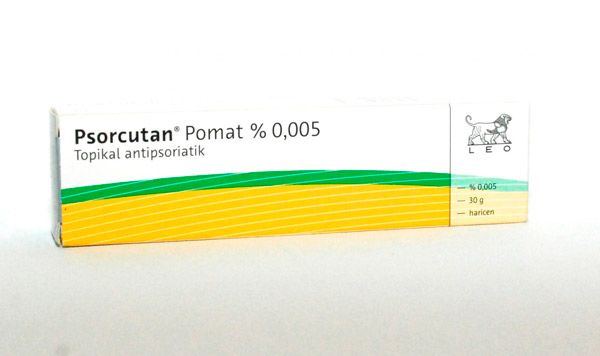
Contraindicated during pregnancy and lactation, at the progressive stage of psoriasis, with pustular psoriasis, severe liver and kidney diseases, individual intolerance to the components. The main side effects of the drug are: allergy, local skin irritation, itching, burning, redness, dermatitis, dry skin, reversible increase in serum Ca2+.
The ointment should be applied only to problem areas once or twice a day. Please note that the maximum daily dose is 15 ml of the drug. Therapy cannot last longer than 1 year. It is not recommended to use with salicylic ointment.
Daivonex. This is an effective non-hormonal preparation based on calcipotriol. It is used to treat psoriasis vulgaris. The product is contraindicated in case of individual intolerance to the components of the ointment and diseases that are accompanied by a violation of calcium metabolism. It cannot be prescribed to pregnant women, nursing mothers, children under 6 years of age. Side effects include: burning, itching, rash, dermatitis, pain, erythema, folliculitis.
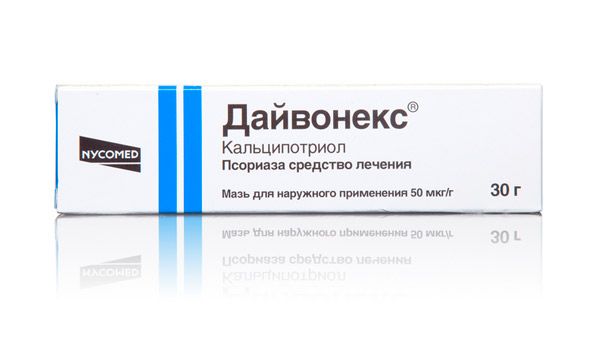
The ointment is applied to the affected areas of the skin twice a day. As a rule, the effect is noticeable after 1-2 weeks of use.
Ointments with oil:
Naftalan ointment (psori-naft, dermo-naft). The active ingredient of the ointment is naftalan oil. It is used for various skin diseases, including psoriasis in the stable phase. It cannot be used by people with chronic heart failure, malignant tumors, acute inflammatory infections, blood diseases.
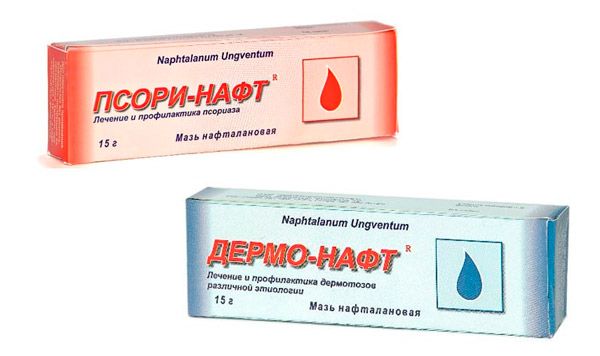
Please note that the results will be increased when interacting with UV radiation. During pregnancy, use only under the supervision of a doctor.
Before applying to the affected areas of the skin, the ointment is first warmed up to +38 degrees. After 20 minutes, the preparation is washed off. The course duration is twenty sessions, which are held daily.
Side effects include: allergies, itching, burning.
Vitamin ointments:
Videstim. Non-hormonal ointment for psoriasis based on vitamin A. Cannot be used in case of: pregnancy (first trimester), hypervitaminosis A, chronic pancreatitis, cholelithiasis. The main side effects include: lethargy, drowsiness, headache, vomiting, nausea, facial flushing, increased cerebrospinal fluid pressure (at an early age), skin rashes.
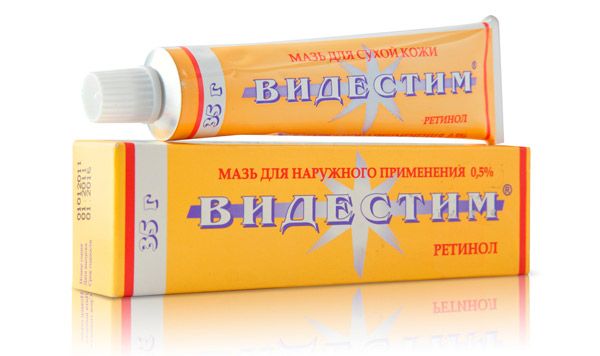
Use as prescribed by your doctor. The dosage is selected individually, depending on the severity of the disease.
Homeopathic remedies:
Psoriaten. A homeopathic preparation that is effectively used to treat psoriasis. The ointment is based on the matrix tincture of Mahonia aquifolium D1. It should not be used in case of individual intolerance to the components of the preparation.
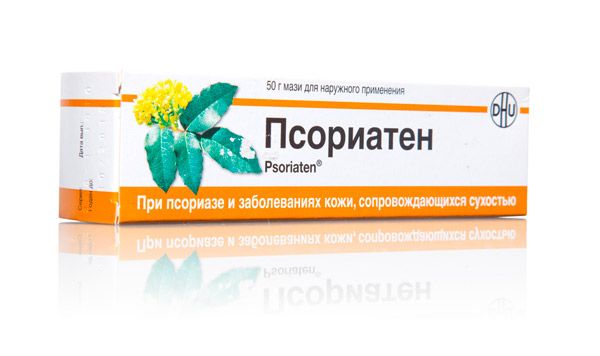
Apply to affected areas of skin (for adults and children over one year) three times a day. Rub in gently with massage movements.
When using the ointment, an allergy may very rarely occur.
Solidol-based products:
Cytopsor. Non-hormonal ointment, which is actively used to treat the main symptoms of psoriasis. Apply to the affected areas of the skin in a very thin layer, rub in. Within 2-5 weeks, redness and inflammation on the skin disappear.
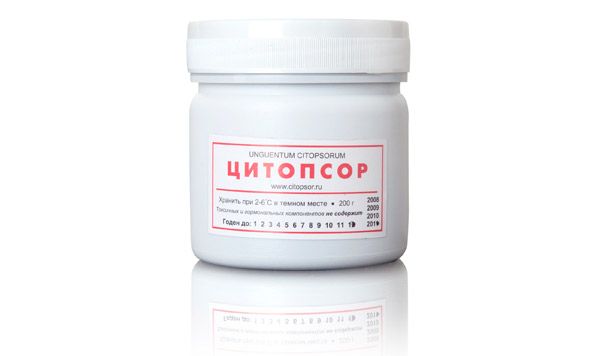
The active ingredients of the ointment are grease and mineral substances. The dosage is selected individually.
Method of administration and dosage
Most of these products are applied in a thin layer only to the affected areas of the skin. The dosage, duration and frequency of use of the ointment is selected individually and depends on the degree of the disease and the severity of the symptoms.
Use non-hormonal ointments for psoriasis during pregnancy
Most ointments should not be taken during pregnancy. They contain potent, toxic substances that can negatively affect the development of the fetus. Many substances, penetrating the blood, significantly change the metabolic processes in the body, which is also extremely undesirable during pregnancy. The ratio of hormones can be disrupted. Almost all active substances from ointments can penetrate the blood, and then through the placenta enter the blood of the child. They can cause significant disruption of the child's development, and can also disrupt the normal hormonal background of the mother and child.
In addition, ointments promote intensive recovery processes in the body. They promote the development, reproduction and division of cells. This is what underlies the development of the fetus. The active substances of the ointment, penetrating into the body, interfere with the normal natural development of the fetus.
It is permissible to use the ointment during pregnancy if the positive effect of the ointment significantly exceeds the negative effect on the fetus. In any case, you cannot use the ointment on your own. You must first consult with your doctor.
It is important to know that not all ointments can be used during pregnancy. Some of them are strictly contraindicated. Negative effects on the fetus and the mother's body are noted when using cinocap, daivonex, psoriaten, magnipsor and psoriazin during pregnancy. These ointments have numerous side effects, have many contraindications, and have a sharp effect on metabolism. They can also create additional stress on the mother's heart and kidneys.
It is not recommended to use salicylic ointment, kartalin during pregnancy. The active substance in these ointments is salicylic acid, which has a strong effect on the human body. Zinc ointment is considered the safest, since it does not contain toxic, potent substances. Use may be contraindicated only if a person is intolerant to zinc oxide.
Losterin is also a safe ointment that can be used during pregnancy. It has an anti-inflammatory, antibacterial effect. The manifestation of allergic reactions is also significantly reduced. There are no side effects.
Videstim is not recommended only in the first trimester of pregnancy. But before you start taking it, it is better to consult a doctor. The main active ingredient is vitamin A, which is a powerful antioxidant. This substance promotes active oxidation-reduction reactions. Due to the action of these substances, there is an increased differentiation of epithelial cells. The skin is actively renewed. The active substance also inhibits keratinization processes.
You can use akrustal. The substances that are part of it are relatively safe and do not cause much harm to the fetus. The composition includes mainly plant extracts and oils. The drug is supplemented with honey, beeswax, and grease. This has a complex effect on the body. It acts not only against psoriasis, but also against hypochromia.
Contraindications
Not all ointments can be used equally often. Many have their own contraindications. Almost all ointments will have a negative effect on the body if allergic or infectious processes occur in it. It is better to refrain from applying ointments during pregnancy and breastfeeding. Ointments should also be applied to children under 1 year old only as a last resort. Before applying the ointment to the entire affected area, first check how your body will react to it. A small test will help for this. Apply a thin layer to a small area of skin. Wait a while until the ointment begins to work. If you do not feel sick, no visible reactions or damage occur, you can safely apply the ointment to the entire area. Make it a rule to consult a doctor before starting to use any ointment.
If you have kidney problems, you should not use salicylic ointment. Then give preference to zinc ointment, which is relatively safe. But this is only if you do not have an individual intolerance to zinc oxide. This can be easily checked using the test above. Zinocap has the same properties. But when choosing this drug, you need to remember that it is incompatible with hormonal ointments and any other hormonal therapy.
If you are being treated for liver or kidney failure, or have elevated calcium levels in your body, Daivonex is definitely not suitable.
It is best to take a closer look at Losterin, Psoriaten, Akrustal - these are the safest drugs that have no contraindications, except for individual intolerance. Psoriaten should not be used only in case of pregnancy and breastfeeding.
Videstim is not recommended for use if the skin is inflamed and in an acute form of inflammation, as well as if there are problems with the kidneys.
Kartalin should not be applied to the skin of the face. And when using it, you need to remember that it is incompatible with sunlight and ultraviolet light.
Psiriaten is not suitable if a person has problems with the kidneys and liver, as well as in the presence of pyoderma and dermatitis. It is not compatible with physiotherapy and sunbathing.
Side effects non-hormonal ointments for psoriasis
Side effects are very diverse. There is practically no ointment that would not have side effects. The use of salicylic and zinc ointments can lead to increased itching, burning. Also, the process can be accompanied by severe hyperemia, edema. An allergic reaction can occur in the treated area. Zinc ointment can lead to the fact that the itch on the skin will intensify even more.
The body tolerates such ointments as tsinokam, losterin, psoriaten well. There are practically no known cases of side effects. In rare cases, allergic reactions are possible, but this most often occurs if it is used for too long or in excessive quantities.
But Daivonex ointment has many side effects. This may be a reaction from the skin, metabolism may be disrupted, the protective function of the body may decrease. Itching and rash may increase. Dryness of the skin increases, it may begin to peel more strongly. Hyperpigmentation or depigmentation may be observed. Contact dermatitis and various types of eczemas may develop against the background of treatment. Sometimes psoriasis intensifies. Swelling of the face may be observed.
One of the most dangerous complications after taking this ointment can be a disruption of the normal functioning of the immune system, which usually manifests itself in the form of systemic angioedema, urticaria, allergies. Constipation may even manifest itself, appetite may decrease, increased fatigue may appear, problems with concentration. In some cases, a decrease in muscle tone is observed. With the development of hypercalcemia, there is increased fatigue, a constant feeling of thirst.
Videstim may increase itching and hyperemia, allergic reactions may occur. The same applies to taking cartalin. These drugs are best taken together with antihistamines. Drowsiness, headache, and skin rashes may also occur.
Magnipsor may cause itching and hives. Body temperature may increase. If Akurstal is taken, local reactions, rashes, and allergies may occur.
Psoriadin can cause psoriasis, provoke its transition to a more severe form or erythroderma. In this case, the risk of developing allergic reactions and associated diseases increases sharply.
Overdose
Cases of overdose for non-hormonal ointments for psoriasis are practically unknown. In exceptional cases, there is an increase in the symptoms of psoriasis, itching, allergic reactions may be observed.
Some medications, such as Daivonex, can cause an increase in calcium concentration in the blood when overdosed. If this happens, you must stop treatment immediately.
Effective non-hormonal ointment for psoriasis
It is not advisable to talk about the most effective ointment. In different situations, at different stages, different ointments may be required. In addition, one should not forget about the individual characteristics of the body. An ointment may help one patient well, but for another it may cause a number of side effects.
From a pharmacological point of view, if we analyze the ratio of contraindications and side effects, we can come to certain conclusions.
The most effective ointments are zinc ointment and losterin. Doctors prefer them because their contraindications and side effects are minimized. They are prescribed even during pregnancy and breastfeeding.
Zinc ointment dries well, is known for its astringent effect. It promotes the adsorption and removal of toxins from the body. This entails a decrease in inflammatory processes, a decrease in itching. The ointment prevents the formation of exudate. It reliably protects against the adverse effects of external factors. Can be applied directly to the site of the rash. It has an optimal price-quality ratio.
Losterin contains several main agents that have a therapeutic effect. Thanks to naphthalene, the anti-inflammatory effect is fully realized. This substance also dilates blood vessels. Due to this, skin nutrition is enhanced, metabolic processes are normalized. Microcirculation improves.
Urea softens the skin, heals wounds, prevents the development of an infectious process. Promotes better absorption of the remaining components of the ointment.
Salicylic acid and D-panthenol heal wounds, prevent penetration and infection. May exhibit keratolytic action. Improves recovery processes.
Plant extracts and oils nourish the skin, saturate it with vitamins, soften and smooth the skin.
The ointment is contraindicated in case of individual intolerance; no special contraindications or side effects have been noted.
Attention!
To simplify the perception of information, this instruction for use of the drug "Non-hormonal ointments for psoriasis: list of effective preparations" translated and presented in a special form on the basis of the official instructions for medical use of the drug. Before use read the annotation that came directly to medicines.
Description provided for informational purposes and is not a guide to self-healing. The need for this drug, the purpose of the treatment regimen, methods and dose of the drug is determined solely by the attending physician. Self-medication is dangerous for your health.

